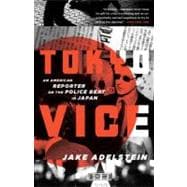From the only American journalist ever to have been admitted to the insular Tokyo Metropolitan Police Press Club: a unique, firsthand, revelatory look at Japanese culture from the underbelly up. At nineteen, Jake Adelstein went to Japan in search of peace and tranquility. What he got was a life of crime... crime reporting, that is, at the prestigious Yomiuri Shinbun.
For twelve years of eighty-hour work weeks, he covered the seedy side of Japan, where extortion, murder, human trafficking, and corruption are as familiar as ramen noodles and sake. But when his final scoop brought him face to face with Japan's most infamous yakuza boss - and the threat of death for him and his family - Adelstein decided to step down... momentarily. Then, he fought back.
In Tokyo Vice, Adelstein tells a riveting, often humorous tale of his journey from an inexperienced cub reporter - who made rookie mistakes like getting in a martial-arts battle with a senior editor - to a daring, investigative journalist with a price on his head. With its vivid, visceral descriptions of crime in Japan and an exploration of the world of modern-day yakuza that even few Japanese ever see, Tokyo Vice is a fascination, and an education, from first to last.
“Marvelous. . . . Tokyo Vice offers a fascinating glimpse into Japan’s end-of-last-century newspaper culture as seen from a gaijin’s perspective. It’s filled with startling anecdotes and revelations. . . . Adelstein writes of his quest for scoops with sardonic wit, and his snappy style mixes the tropes of detective fiction with the broader perspective of David Simon’s books as he makes a careful account of his journalistic wins and losses. . . . The author’s gallows humor bleeds into even darker, more serious hues once Adelstein starts covering the Japanese mafia. . . . Astonishingly proves that no matter how weird and perverse Japan may seem in fiction, the real thing never fails to exceed our most violent expectations.”—Sarah Weinman, Confessions of an Idiosyncratic Mind
“Exposes Tokyo’s darkest, seamiest, most entertaining corners. . . . A gritty, true-to-life account of 12 years on the news beat as a staffer for a Japanese daily — and it is exceptional. Its classic atmospherics rekindle memories of Walter Winchell and Eliot Ness. It’s a tale of adrenalin-depleting 80-hour weeks, full ashtrays, uncooperative sources, green tea, hard liquor, and forays into the commercialized depravity of Shinjuku’s Kabukicho. . . . Definitely raises the bar. . . . A classic piece of 20th century crime reporting.”—The Japan Times








